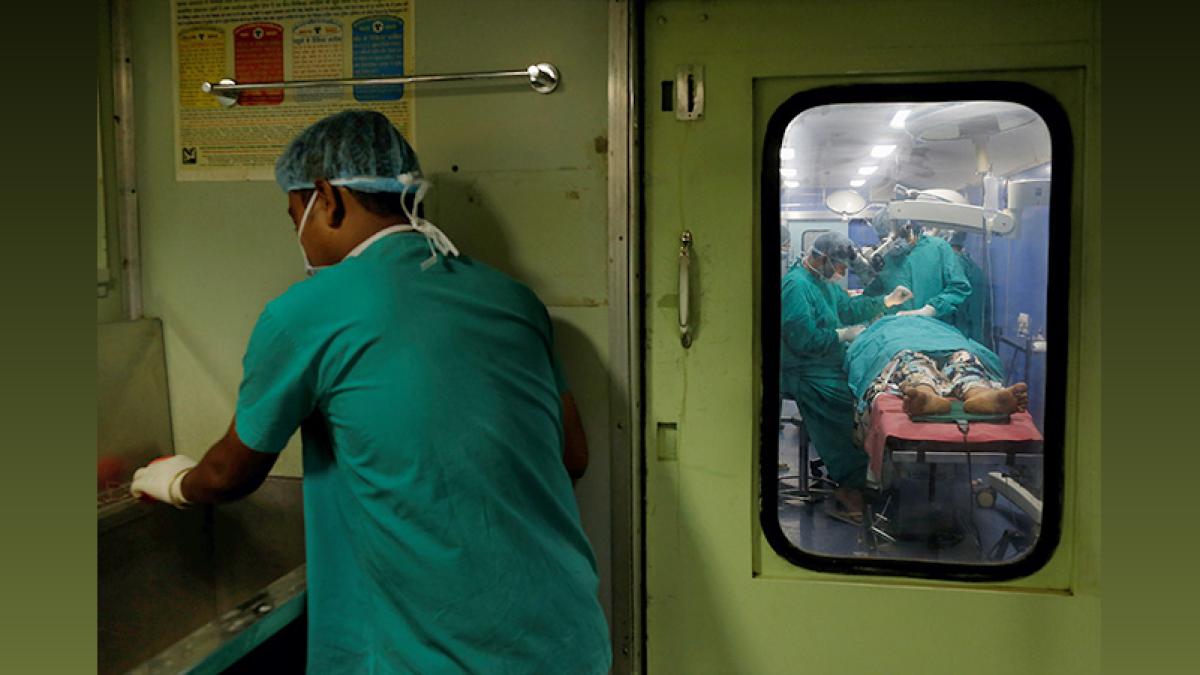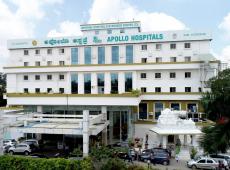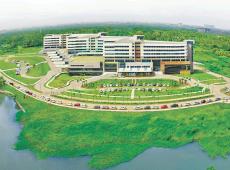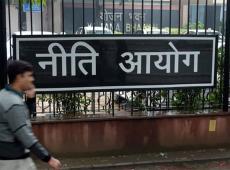Delhi Economic Survey: 11 Hospital Projects Underway
By Rediff Money Desk, NEWDELHI Mar 01, 2024 17:03
Delhi's Economic Survey reveals 11 new hospital construction projects underway, alongside hospital upgrades and data on birth, death, and dengue rates. Read more.

Photograph: Danish Siddiqui/Reuters
New Delhi, Mar 1 (PTI) Eleven structural medical facilities, including new hospitals, are under construction at present in the national capital, while several other existing hospitals are also being upgraded with more infrastructure, according to the latest Delhi Economic Survey.
A report on the survey was presented by Delhi Finance Minister Atishi in the Assembly on Friday.
It also said that during the current fiscal year, 7,493 dengue cases were reported in Delhi till November 25 and a total of seven dengue deaths have been reported during the same period.
The survey shared data on birth and death rates as well. The birth rate in Delhi had increased to 14.24 per thousand of population during 2022 as against 13.13 for the year 2021. The death rate per thousand of population had declined to 6.07 during 2022 as against 8.28 in 2021.
As on March 31, 2023, the Delhi government is providing preventive, promotive and curative health care services to the citizens of Delhi through 38 multispecialty and super specialty hospitals, 174 allopathic dispensaries, 60 seed primary urban health centres, 521 Aam Aadmi Mohalla Clinics, 30 polyclinics, 55 Ayurvedic dispensaries, 25 Unani dispensaries, 117 homeopathic dispensaries and 46 school health clinics, the report said.
"At present, 11 hospitals are under construction," as per the report, which also mentioned various project details.
These 11 projects also include new blocks coming up at hospitals like GTB Hospital and Chacha Nehru Bal Chikitsalaya.
Hospital projects are underway at Vikaspuri, Jwalapuri, Shalimar Bagh and Sultanpuri.
The physical progress of the Vikaspuri hospital project is 45 per cent and the target date of completion is December 31, 2024, the report says.
At GTB Hospital in east Delhi, a 1912-bed block is coming up. The physical progress on this project is 82 per cent, the report says, adding, "Work in a stand still position since July 2023. Completion depends on sanction of revised estimate, i.e. 6 months time".
Besides, the Delhi government has decided to remodel 15 existing hospitals so as to enhance the number of existing beds as per FAR (floor area ratio) norms. Around 6,000 new beds will be added after completion of remodelling of these hospitals, according to the survey report.
These hospitals include the LNJP Hospital, Dr B R Ambedkar Hospital, Ambedkar, Deep Chand Bandhu Hospital and Hedgewar Arogya Sansthan. The report adds that physical work has "not started at all" at Hedgewar Arogya Sansthan.
Delhi Chief Minister Arvind Kejriwal in October 2020 laid the foundation stone for construction of a towering state-of-the-art 1,500-bed block at LNJP Hospital that will make it one of the largest facilities in the country.
The expenditure on health and family welfare under scheme, programme, projects of the Delhi government "increased more than the two times during the last seven years from Rs 1,999.63 crore in 2015-16 to Rs 4,158.11 crore in 2022-23 and hovering around 13 per cent of the total expenditure on all schemes/programmes and projects except for the year 2019-20".
Further, during the COVID-19 period of 2020-21 and 2021-22, the same was around 16 per cent of total expenditure, it said.
The total number of medical institutions in Delhi in 2015-16 stood at 3,014 and the figure was 3,423 in 2022-23, as per the report.
There are a number of reasons behind the slow pace of extension of new health outlets and the first and the foremost is "non-availability of land". Multiplicity of agencies and shortage of experienced manpower are the reasons in line for slow extension of health facilities. Moreover all the hospitals, especially major hospitals in Delhi attend to heavy patient workload, it said.
According to the recommendations of the World Health Organization (WHO), the recommended bed population ratio is five beds per a population of 1,000. However, the bed population ratio in Delhi in 2022-23, has remained at 2.70 which is much below the WHO norm, it said.
The survey also mentioned that at the end of the financial year 2022-23, the total sanctioned bed capacity in Delhi decreased to 57,686 beds at 1,153 government and private medical institutions and hospitals, from 58,960 beds available, as on March 31, 2022.
"Sanctioned bed capacity in Delhi decreased particularly in hospitals run by the Government of India and Municipal Corporation of Delhi. In hospitals, run by the government of India this has decreased from 9,544 in 2021-22 to 9,386 in 2022-23," it added.
A report on the survey was presented by Delhi Finance Minister Atishi in the Assembly on Friday.
It also said that during the current fiscal year, 7,493 dengue cases were reported in Delhi till November 25 and a total of seven dengue deaths have been reported during the same period.
The survey shared data on birth and death rates as well. The birth rate in Delhi had increased to 14.24 per thousand of population during 2022 as against 13.13 for the year 2021. The death rate per thousand of population had declined to 6.07 during 2022 as against 8.28 in 2021.
As on March 31, 2023, the Delhi government is providing preventive, promotive and curative health care services to the citizens of Delhi through 38 multispecialty and super specialty hospitals, 174 allopathic dispensaries, 60 seed primary urban health centres, 521 Aam Aadmi Mohalla Clinics, 30 polyclinics, 55 Ayurvedic dispensaries, 25 Unani dispensaries, 117 homeopathic dispensaries and 46 school health clinics, the report said.
"At present, 11 hospitals are under construction," as per the report, which also mentioned various project details.
These 11 projects also include new blocks coming up at hospitals like GTB Hospital and Chacha Nehru Bal Chikitsalaya.
Hospital projects are underway at Vikaspuri, Jwalapuri, Shalimar Bagh and Sultanpuri.
The physical progress of the Vikaspuri hospital project is 45 per cent and the target date of completion is December 31, 2024, the report says.
At GTB Hospital in east Delhi, a 1912-bed block is coming up. The physical progress on this project is 82 per cent, the report says, adding, "Work in a stand still position since July 2023. Completion depends on sanction of revised estimate, i.e. 6 months time".
Besides, the Delhi government has decided to remodel 15 existing hospitals so as to enhance the number of existing beds as per FAR (floor area ratio) norms. Around 6,000 new beds will be added after completion of remodelling of these hospitals, according to the survey report.
These hospitals include the LNJP Hospital, Dr B R Ambedkar Hospital, Ambedkar, Deep Chand Bandhu Hospital and Hedgewar Arogya Sansthan. The report adds that physical work has "not started at all" at Hedgewar Arogya Sansthan.
Delhi Chief Minister Arvind Kejriwal in October 2020 laid the foundation stone for construction of a towering state-of-the-art 1,500-bed block at LNJP Hospital that will make it one of the largest facilities in the country.
The expenditure on health and family welfare under scheme, programme, projects of the Delhi government "increased more than the two times during the last seven years from Rs 1,999.63 crore in 2015-16 to Rs 4,158.11 crore in 2022-23 and hovering around 13 per cent of the total expenditure on all schemes/programmes and projects except for the year 2019-20".
Further, during the COVID-19 period of 2020-21 and 2021-22, the same was around 16 per cent of total expenditure, it said.
The total number of medical institutions in Delhi in 2015-16 stood at 3,014 and the figure was 3,423 in 2022-23, as per the report.
There are a number of reasons behind the slow pace of extension of new health outlets and the first and the foremost is "non-availability of land". Multiplicity of agencies and shortage of experienced manpower are the reasons in line for slow extension of health facilities. Moreover all the hospitals, especially major hospitals in Delhi attend to heavy patient workload, it said.
According to the recommendations of the World Health Organization (WHO), the recommended bed population ratio is five beds per a population of 1,000. However, the bed population ratio in Delhi in 2022-23, has remained at 2.70 which is much below the WHO norm, it said.
The survey also mentioned that at the end of the financial year 2022-23, the total sanctioned bed capacity in Delhi decreased to 57,686 beds at 1,153 government and private medical institutions and hospitals, from 58,960 beds available, as on March 31, 2022.
"Sanctioned bed capacity in Delhi decreased particularly in hospitals run by the Government of India and Municipal Corporation of Delhi. In hospitals, run by the government of India this has decreased from 9,544 in 2021-22 to 9,386 in 2022-23," it added.
Read More On:
DISCLAIMER - This article is from a syndicated feed. The original source is responsible for accuracy, views & content ownership. Views expressed may not reflect those of rediff.com India Limited.
You May Like To Read
TODAY'S MOST TRADED COMPANIES
- Company Name
- Price
- Volume
- Vodafone Idea L
- 7.45 ( -2.87)
- 32142272
- Srestha Finvest
- 0.69 (+ 1.47)
- 30936208
- Suzlon Energy Ltd.
- 54.60 ( -8.07)
- 25525100
- GTL Infrastructure
- 2.03 ( -3.79)
- 12441892
- AvanceTechnologies
- 0.92 ( -3.16)
- 10206370
MORE NEWS

Silver Prices Surge on Spot Demand - PTI
Silver prices jumped by Rs 633 to Rs 89,960 per kilogram on the Multi Commodity...

LTIMindtree Expands US Presence with Houston...
LTIMindtree opens new facility in Houston, focusing on AI, digital transformation, and...

Swiggy CEO: Expecting Solid Growth in Next 3-5...
Swiggy CEO Sriharsha Majety expects strong growth in the next 3-5 years, driven by...












 © 2024 Rediff.com India Limited. All rights reserved.
© 2024 Rediff.com India Limited. All rights reserved.